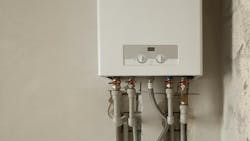Residential Boiler Market Projected to Surpass $164B by 2035
The residential boiler market is expected to grow from its current value of $60 billion to over $164 billion by 2035, growing at a CAGR of around 7.6% till 2035, as per the research done by Market Research 365.
The rising demand for energy-efficient alternatives and a focus on lowering carbon emissions has led to a surge in the request for residential boilers. This trend is evident in both individual homes and larger residential complexes, leading to a beneficial influence on the sector. Residential boilers offer numerous benefits, such as decreased energy expenditures, enhanced comfort, and lowered operational costs. These advantages collectively create a favorable outlook for the industry.
Reasons Why
Increasing electricity demand and the extensive use of heat-producing sources are spurring a transformation in conventional boiler technology, encouraging the adoption of residential boilers. Nations characterized by elevated energy consumption are proactively exploring energy-efficient alternatives to align with emission standards. These initiatives target emissions reduction while concurrently enhancing energy stability and sovereignty by addressing the growing need for heat. As a result, a favorable market setting is emerging, offering significant business opportunities within the residential boiler sector.
The momentum behind incorporating intelligent technology into residential boilers is steadily increasing. The integration of smart features enables remote management, tracking, and fine-tuning of heating systems, delivering enhanced comfort, convenience, and energy efficiency to homeowners. As the emphasis on decarbonization intensifies, there is a growing interest in hydrogen-compatible boilers. Engineered to adapt to the prospective adoption of hydrogen as a low-carbon fuel, these boilers offer a potential avenue for long-term reduction of carbon emissions.
State of the Market
The residential boiler sector experienced substantial difficulties and disturbances due to the COVID-19 pandemic. Lockdown measures not only affected the production capabilities of boiler manufacturers but also led to a decrease in demand for residential use. Nevertheless, there has been a discernible market revival since late 2021, with numerous manufacturing industries restarting operations.
Consumers and governments alike have been increasingly focused on energy efficiency and reducing carbon emissions. Electric residential boilers, being relatively cleaner and more energy-efficient than their fossil fuel counterparts, have gained attention as a more environmentally friendly heating solution. As the adoption of renewable energy sources has grown, there has been interest in integrating electric boilers with these systems. Excess electricity generated from renewables can be used to power the boilers, contributing to reduced energy bills and a lower carbon footprint.
Condensing Technology
Condensing boilers are engineered with a primary focus on maximizing energy efficiency through the recuperation of heat from exhaust gases, resulting in decreased emissions of greenhouse gases. Anticipated effects on the demand for residential boilers include substantial influence from government tax incentives and rebates. Noteworthy features such as a smaller footprint and not requiring a hot water tank contribute to the heightened adoption of these heating systems. These characteristics not only amplify convenience but also optimize space utilization.
Summary
Energy efficiency and environmental concerns have been driving the North America residential boiler market. Consumers and regulators have shown a growing interest in low-emission and high-efficiency heating solutions. Government initiatives have been influencing consumer decisions and driving the adoption of energy-efficient residential boilers. These incentives aim to accelerate the replacement of older, less efficient heating systems with modern and eco-friendly alternatives.
Key players in residential boiler market are PB HEAT, Lennox International, HTP, Bradford White Corporation, Viessman, Weil-McLain, A.O. Smith, U.S. Boiler Company, NTI Boilers, Slant/Fin Corporation, ECR International, IBC Technologies, Navien Inc., Allied Engineering Company, Triangle Tube, Thermo-Dynamics Boiler Company, Granby Industries, Camus Hydronics, Baxi North America and King Heating Products.
To download the full report, visit https://www.marketresearch365.com/industry-insights/residential-boiler-market-1162
